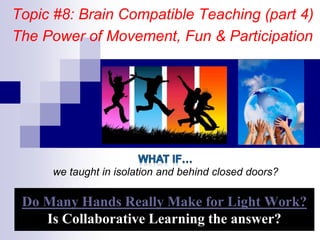
Topic 8: The Power of Movement, Fun and Collaboration
- 1. Do Many Hands Really Make for Light Work? Is Collaborative Learning the answer? Topic #8: Brain Compatible Teaching (part 4) The Power of Movement, Fun & Participation we taught in isolation and behind closed doors?
- 2. Inquiry Questions: Why is cooperative learning such an effective teaching strategy in the interactive middle school classroom? What does brain research say about the value of movement, fun, & participation in learning? How can we implement cooperative learning using different “structures”? Many children/adults do not find group work/ collaborative learning to be “fun”
- 3. Graphic Organizer: PMI Chart The Power of Movement, Fun & Participation
- 7. Our targets for the day? 1. I will define the instructional concept of “Cooperative Learning” and explore the research that supports its many benefits. 2. I will determine the five essential elements of Cooperative Learning 3. I will explore and utilize different tools and structures for using cooperative learning effectively 4. I will use various cooperative learning structures to learn about the concept of Academic Controversy centered around current issues with “Assessment for Learning” Today’s Leaning Tool: PMI Chart
- 8. Competitive Learning Individualistic Learning Cooperative Learning What do the job ads tell us? http://www.calgaryherald.com/jobs/job-listings/index.html
- 9. Cooperative Learning: What is it? Academic Vocabulary: Four Fold Concept
- 10. What’s your proof that CL works? Research?? Real world examples?? Examples from your practicums?? Debating Dyads: Academic Controversy: Cooperative Learning in the 21st Century is NO DIFFERENT than Group Work was in the 20th Century Conjunction Conversation 1. If you agree, use words like “and”, “also”, “when”, etc. 2. If you disagree, use words like “but”, “or”, ”when”, “if only”, “however”, etc.
- 11. Cooperative Learning: a definition Cooperative Learning is an instructional strategy in which students interact with members of a group/team in order to reach a common goal. Although group members collaborate, each student is accountable for the achievement of the goal. With appropriate guidance and assessment, students use and refine both cooperative and academic skills as they work together.
- 12. CL: The good, the bad & the ugly Doing: “Inside/Outside Circles” Doing: T Chart – Effective Teamwork Skills
- 14. Higher achievement and increased retention Greater use of higher level thinking skills Greater ability to view situations from different perspectives Greater intrinsic motivation More positive, accepting and supportive relationships with peers More positive attitudes towards learning Greater social support – we are “social” creatures More on task and engaged behavior Greater cooperative skills and attitudes necessary for working effectively with others. *from the research of D.W. Johnson and R. Johnson Cooperative Learning: the benefits* Doing: Turn and Talk for 2 (Regurgitation)
- 15. Retrieved from “What did you do in school today?”, Canadian Education Association, 2009
- 17. Constructivism in Instructional Strategies Where do students “construct” their own meanings? Where do students “direct” their own learning? MARZANO TATE BENNETT SILVER The Big Seven Compare/Contrast Cooperative Learning Games/Movement Organizers Summarizing and Note-making Drawing Problems/Debates
- 18. Digital and Technological Fluency Communication Social, Cultural, Global and Environmental Responsibility Creativity and Innovation Critical Thinking, Problem Solving and Decision Making Collaboration and Leadership Lifelong Learning, Personal Management and Well-Being Where does “collaborative learning” fit with 21st Century Learning?
- 20. Cooperative Learning: Why Not? Why Does it Not Work? Pre-requisites: 1) a sense of team spirit (create an “esprit de corps”) 2) trust 3) teach/assess pro-social skills (e.g. conflict resolution) 4) some learners need QUIET to learn
- 21. Positive Interdependence Face to Face Interaction Individual Accountability Interpersonal and small group skills Group processing Cooperative Learning: key ingredients* *from the research of D.W. Johnson and R. Johnson *Spencer Kagan prefers PIES: Positive Interdependence Individual Accountability Equal Participation Simultaneous Interaction
- 23. Think Pair Share Compare Find Someone Who… Round Table Inside/Outside Circles 4 Corners Value Line Rally Robin The Jigsaw 3 Person Interview Cooperative Learning: the structures* *from the work of Spencer Kagan, www.kaganonline.com
- 24. Teambuilder Spinner, Ways to Pair Social Skill T-Chart Voice Control Traffic Signs Timer Tools Team Tools Selector Tools Decision Making Tools CL Lesson Plan Team Encouragers Seating Arrangements CL Roles Assessment: CL Rubric, Team-o-graph Dice, cards, chips, popsicle sticks, chart paper, etc. Cooperative Learning: the tools* *from the work of Spencer Kagan, www.kaganonline.com
- 25. Digital and Technological Fluency Communication Social, Cultural, Global and Environmental Responsibility Creativity and Innovation Critical Thinking, Problem Solving and Decision Making Collaboration and Leadership Lifelong Learning, Personal Management and Well-Being In order to change how/what we assess… Ontario’s Provincial Report Card Local Examples: LUES CLIVE …Think Differently
- 26. Pre-test: Where do you stand on the “Assessment/Homework Issues”? Value Line: Two hot topics: 1) Value Line #1: Should we give grades (letters/numbers) to middle school students? 2) Value Line #2: Should we give homework to middle school students? Jigsaw: Assessment and Homework Practices in Today’s Classrooms (Article review - Homework) Next Week: Academic Controversy
- 27. Wise Words of the Week “Information becomes knowledge when accomplished in a “social‟ environment” **Michael Fullan Topic #8: Brain Compatible Teaching (part 4) The Power of Movement, Fun & Participation